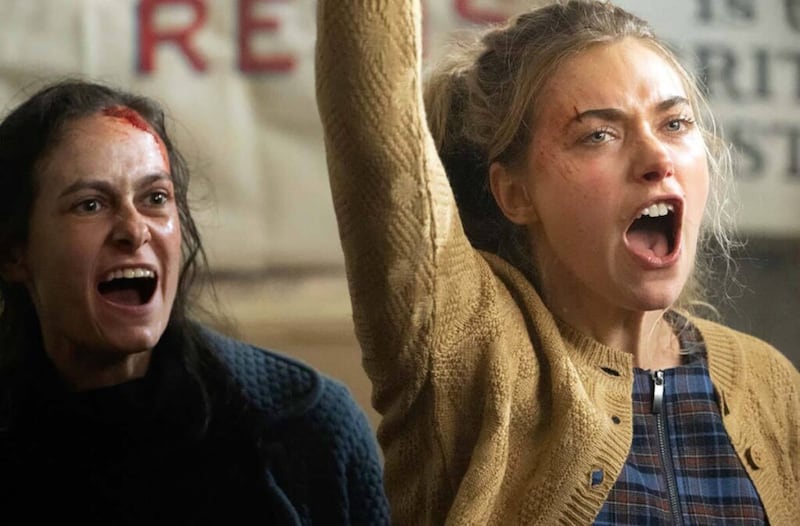GIVEN that her life story reads like something out of a thriller, it’s fitting that the recently deceased Rose Dugdale - who rejected her upper-class roots as the Oxford-educated daughter of a millionaire English banker to become a socialist revolutionary and gun-toting IRA-acolyte - should now be the subject of a movie.
Irish writing/directing duo Joe Lawlor and Christine Molloy, who helmed 2019′s excellent slow-burning psychological thriller, Rose Plays Julie, flex their tasteful indie cinema skills once again with Baltimore - titled in reference to the coastal Co Cork village, for reasons that will become clear while watching - recruiting Imogen Poots (28 Weeks Later, Green Room) to portray Dugdale in a film which dramatises one of the headline-grabbing heiress’s most infamous moments: the multi-million pound art heist planned and led by the rich girl revolutionary at Russborough House in Co Wicklow in April 1974.
That her other ‘greatest hit’ was a failed bomb attack on Strabane RUC station utilising a hijacked helicopter just a couple of months beforehand gives you some idea of her revolutionary zeal.
Over eight-million Irish Punts-worth of art was liberated by Dugdale and her three-man team during their Russborough House raid, including Vermeer’s Lady Writing a Letter with her Maid and Venus Supplicating Jupiter by Rubens.
“It’s like lookin’ at the birth of f***ing imperialism,” spits Dominic of the latter work, which depicts Venus brokering Rome’s world domination on behalf of her son, Aeneas.

Read more:
- Rose Dugdale, the English heiress and IRA member, dies days before release of film on her lifeOpens in new window
- Rose Dugdale: Directors of new drama feature want to make contact with English heiress turned IRA volunteer on the eve of general releaseOpens in new window
- Rose Plays Julie is a 'deliciously nightmarish' independent Irish thrillerOpens in new window
The gang pistol-whipped elderly homeowner Sir Alfred Beit, his wife and their cook during the raid. After making their escape, they threatened to destroy the looted paintings unless imprisoned IRA members - including Dolours and Marian Price who were then on hunger strike in Brixton Prison - were released and repatriated back to Ireland.

By the time of the heist at Russborough House, Dugdale was in her early 30s and already on the run for the aforementioned helicopter attack.
The film intercuts the actual heist, an at times comically clumsy affair (the pistol-toting English heiress donned a ginger wig and adopted a dodgy French accent as a ‘cover’), punctuated with moments of horrific brutality, and its gang-in-hiding aftermath with flashbacks to her earlier life in which we witness her gradual evolution from demure debutante and reluctant heiress to passionate class warrior and arms-bearing freedom fighter.
Ironically, Dugdale’s time reading Philosophy, Politics and Economics at elite academic institution Oxford University proved crucial to this metamorphosis, coinciding with the rise of student activism and offering her the opportunity to bond with likeminded lefties over shared frustrations with the patriarchal establishment, England’s class system and British imperialism.

The news reports from Derry on Bloody Sunday in 1972 is pinpointed by the film as the moment her civil rights passion blossomed into a righteous anger and a resolve to personally fight for Irish freedom: soon she is being vetted by visiting IRA men about her time in Cuba and tested on her bomb-making skills.
Reliably mesmerising in her abundance of close-shot scenes, Poots imbues Dugdale with a convincingly steely resolve, though the script also ensures we know that she harbours private fears about what might be required of her from new revolutionary role - a situation complicated by her romantic entanglement with one of her IRA comrades, Eddie (Jack Meade).

Students of history will already know the outcome of the Russborough House heist, but even those watching with zero prior knowledge of the incident will quickly get a sense of which way things are headed as Dugdale and co hide out in a remote lakeside cottage in Co Cork during the ensuing nationwide manhunt.
For a start, their attempt at laying low could have used a bit of work: with her posh English accent and groovy early-70s student threads, Dugdale sticks out like a blonde and bohemian sore thumb in the tiny rural village she must visit in order to communicate their demands to the authorities.
Not enough care is taken to limit contact with the outside world - notably a kindly, half-blind local farmer called Donal (the excellent Dermot Crowley) - and even seasoned ‘RA man Dominic (Tom Vaughan-Lawlor giving good ‘soulful hardman’) seems to let his guard down for the sake of soaking up the area’s natural beauty, maximised on-screen by cinematographer Tom Comerford’s evocative, atmospheric lensing.
Furthermore, Dugdale chooses to deliver her demands via a payphone in the corner of The Quietest Pub in Ireland while using her, how you say, ‘trezz suzzpishush French akzzent’, as the busybody barmaid listens on from behind the beer taps mere feet away.
The contrast between such comedic ineptitude and sobering moments of violence - real and imagined - adds to the film’s engagingly unsettling tone, as does a superb score by Stephen McKeon which incorporates outbursts of ear-shatteringly loud percussion, ominous instrumental drone and woodwind wistfulness.
As reflected in this week’s news reports following her death at the age of 82, Dugdale’s actions made her a divisive figure in Ireland and her homeland, and the film-makers’ rather empathetic take on her motives and character may not sit well with some: others will doubtless be left pondering why more English people weren’t ‘radicalised’ by their own media’s damning coverage of what occurred on Bloody Sunday.
As for what Rose herself would have made of this lean, stylish and suspenseful thriller based on her controversial deeds, we will never know.







